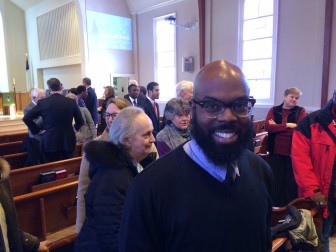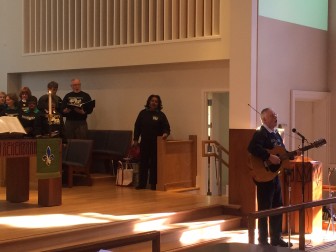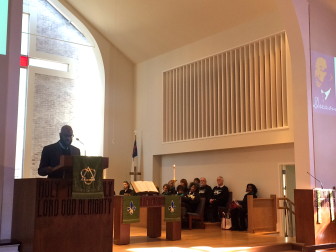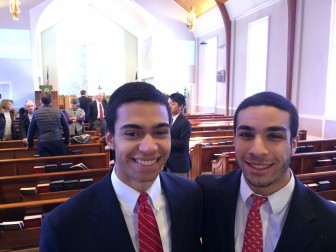Reading the Rev. Dr. Martin Luther King Jr.’s “The Other America” speech put Jason Michael Land in mind of something that his grandmother used to say.

Jason Michael Land following the Jan. 18, 2016 Rev. Dr. Martin Luther King Jr. remembrance service at United Methodist Church in New Canaan. Credit: Michael Dinan
A 2003 New Canaan High School graduate and ABC student here in town who has since gone on to Yale Divinity School, Land on Monday morning recalled that she would say “God made us all in his image—not some of us black and inferior, not some of us white and superior.”
“Believe it or not, I learned this lesson here, in New Canaan, the ‘Next Station To Heaven’ ” Land told more than 200 people gathered inside United Methodist Church on South Avenue for an annual service in remembrance of King. “Now I would be lying if I said that it was easy, because it definitely was not. However, I did find that I am no better nor worse than anyone else. I did learn that I have a mother and brothers and sisters who look nothing like me, but who will support and defend me to the very end. And I would do the same for them. My perceptions of race, class and faith were broadened here, while my sense of self was sharpened. We must learn to love one another.”

Former Center School teacher Bruce Taylor plays guitar with the Serendipity Chorale, here leading the congregation at United Methodist Church in New Canaan in “Amazing Grace” on Jan. 18, 2016. Credit: Michael Dinan
Sponsored by the Interfaith Council of New Canaan and with a welcome from the host church’s pastor, Rev. Eric Fjeldal, the stirring service included music from the Serendipity Chorale and Pivot Ministries, a Proclamation read by Selectman Beth Jones, a responsive reading led by ABC student and NCHS class of 2017 member Rajon Mitchell and testimonies from ABC House of New Canaan’s two seniors, Christopher Roman and Brian MacCalla Jr.
Land, himself an alumnus of the same college as King (Morehouse) and a fellow fraternity brother (Alpha Phi Alpha), in his address weaved direct quotes from King’s “The Other America” speech—delivered in 1967 and again at a high school in Michigan in 1968, less than one month before the civil rights leader was assassinated—with current events, reflections on race and anecdotes from his own life, including as a scholar.

Jason Michael Land addresses those gathered Jan. 18, 2016 at United Methodist Church in New Canaan for the Rev. Dr. Martin Luther King Jr. remembrance service. Credit: Michael Dinan
“I have a habit of writing down unfamiliar words when hearing them, and since starting at Yale, I’ve become unsure that I even speak English,” he said, drawing laughter from the crowd.
“A new favorite, however, is ‘praxis.’ P-R-A-X-I-S. According to our friends at Merriam-Webster, praxis is ‘the process by which a theory, lesson or skill is enacted, practiced, embodied or realized.’ I know. I mention ‘praxis’ to say that there is so much work left for us to do, and I believe we can do it. We can be a generation of Americans committed to combating the ills of American society. One can offer 1,000 speeches, meet with the young in order to discuss the pressing issues of our time, but it means nothing, it is all for naught, without praxis. Without enacting, practicing, embodying or realizing our theories, lessons or skills, we are really just talking while the clock keeps ticking. And so we must be intentional with our fellow man, we must afford ourselves the opportunity to change the course of history by continuing King’s work and creating a better America for us all.”

Christopher Roman and Brian MacCalla Jr. at the Jan. 18, 2016 remembrance service for the Rev. Dr. Martin Luther King Jr. at United Methodist Church in New Canaan. Credit: Michael Dinan
Land cited two myths that King draws out in his speech—that time, left alone, would simply solve the problem of racial injustice eventually, and that legislation cannot change people’s hearts—and like a man he described as his “everything,” encouraged those gathered to deal relentlessly with the truth.
“In both an election year and in the wake of failures to indict officers responsible for the deaths of unarmed African-Americans, our thoughts turn toward our collective power to generate legislative change,” he said. “Many marched alongside Dr. King and plenty of others died so that we might all enjoy equal voting rights. But who are we voting for? Do they support policies that exacerbate our American dilemma? Are we brave enough to name and challenge systematic oppression?”
Quoting King in describing “the other America” as a place of “daily ugliness” that “transforms the buoyancy of hope into the fatigue of despair,” Land called the speech thought-provoking, unnerving and familiar.
“That’s right: I’m Other-American, and you just might be too,” he said.
“While no longer at back of the bus or openly denied voting rights, our reality has become Trayvon Martin, Michael Brown Jr., Tamir Rice and Sandra Bland. For some, reality hit close to home during Hurricane Katrina, while for others in Baltimore or in Charleston, South Carolina. The disproportionate incarceration of people of color, gentrification of urban areas across the land, inadequate education systems, limited healthcare resources and food waste plans are just a few of the racial injustices still flowing like a poison water supply down from Flint, Michigan.”
Like a biographical video projected on the walls during the service, both Roman and MacCalla spotlighted facts of King’s life during their own speeches. Roman noted that “no dream or action is impossible to achieve” and said that most of the time, people must come together to achieve their highest goals.
MacCalla said he had an eye-opening conversation recently during a college interview, with an alumnus of the school who happened to be born to Nigerian parents. During the conversation, MacCalla said he asked the woman how it was “being a minority in a predominantly white school.”
“I was expecting her answer to be about how she encounters racism day by day, and how it has changed since she attended the university. Instead, she responded, ‘That is our problem.’ I said, ‘Excuse me?’ She repeated, ‘That is our problem. The fact that we label and judge today is the reason we still encounter racism.’ She continued, ‘Calling me a minority suggests that there is a greater, more important majority. People should not feel bad that we are black or even think about it at all. When somebody looks at me, I don’t want them to think anything about the color of my skin, because that leads them to [draw] other conclusions about me.’ ”
MacCalla said he wrestled with the lesson this woman had taught him, and that he’s come to embrace her message.
“I know that myself as well as everybody in this room has labeled somebody in their lives based on the color of their skin,” he said. “Sometimes we label, and then our opinions shift when we get to know a person. When somebody looks at me, I don’t want to have to prove them wrong or surprise them with the way that I am. I believe that everybody deserves a clean slate and I am sure you all agree because that is certainly what Dr. King wanted for us as a society. All of the boys at ABC House are minorities, but should we have to be labeled as that?”
Once again, the interfaith council in New Canaan organized a meaningful, memorable celebration of M. L. King’s birthday. This is special as it is also the 42nd anniversary of the arrival of the ABC program in New Canaan. As always, the boys of the house impressed the large gathering with their presence, poise and presentations. We are all so proud of the boys and the many people who populate the support team to ensure their care and their continued success. A shining example of the success of the ABC program is Jason Land, a graduate, who delivered a powerful talk that enjoined everyone to carry on with the work of Dr. King to ensure that love and respect and peace and care prevail. Thank you one and all for this meaningful moment for our community.